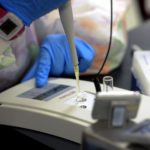UWF summer marine science camp teaches children about the gulf and oil Spill
A University of West Florida Explore Summer program is teaching elementary students all about marine biology as well as a lesson or two about the oil spill in the Gulf of Mexico which is now impacting the very beaches many of the kids call home.
Jennifer Edge, Explore Summer director at the Division of Continuing Education, says the weeklong Marine Science Camp, held for the third year at Pensacola Beach Elementary School, is popular with students and their parents. Activities include hands-on science, art and lecture classes as well as one-the-beach research and experimentation. The camp has different group of 120 students each week for two weeks. Teachers are from the area, with one traveling from Tampa, and volunteers include parents, teachers and UWF students. The UWF Biology Department provides marine life to dissect as well as a van for transportation while International Paper provides environmentally friendly book bags for the science campers.
Here’s a recap of a typical morning at the science camp:
– Sitting at tables on a covered patio outdoors, students scrutinize a rubbery, formaldehyde-preserved squid lying in a dissecting tray while science teacher Gina Emery points out the critter’s essential parts. Squids have a beak just like birds, she tells them while showing them where to find it inside the esophagus. Emery is a teacher at Niceville High School.
– In the next hour, the group relocates across the road beachside at Pensacola Sound. Justin Speaks, a UWF biology graduate assistant, soon introduces the campers to what they can’t see underneath the water’s surface but thriving in the water’s knee-deep seagrass beds. “We’re here to explore and learn about whatever we can find in this part of the ecosystem,” Speaks says. Standing in the water, he shows students how to use hand nets and how to work in pairs using a seine net to fish along the sound’s bottom. With a little help from a student, he demonstrates flipping the seine net’s contents onto the sand to the excited screams of the onlookers as they see the tiny minnows wiggling around in the brown seagrass.
– In Kirsten Patterson’s room, students, in groups of three, put the finishing touches on their “beaches” – a metal baking pan filled with sloped sand and blue water complete with basil “palm trees,” tarragon “sea oats,” and toothpick walkways. The following day, the class would learn about environmental disasters when an “oil spill” claimed their “beaches.”
– In another classroom, Bee Nash, an art teacher from Spencer Bibbs Elementary School, watches kindergarten and first -grade students draw what they say at the beach that morning. Red and brown crabs, green turtles and bright blue dolphins frolic on the paper.
The Marine Science Camp is one of 30 UWF Explore Summer programs, Edge says. Others planned in the weeks ahead through mid-August include: a William Shakespeare-inspired theater enrichment program for all aspiring young thespians; a science camp where students learn how to dissect crime scenes a la “CSI”; and a social studies/archeology program which digs deep into Pensacola’s history.
For more information on UWF Explore Summer programs, contact Edge at jedge@uwf.edu or visit uwf.edu/explorecamps.
By Susie Forrester, University Marketing Communications


